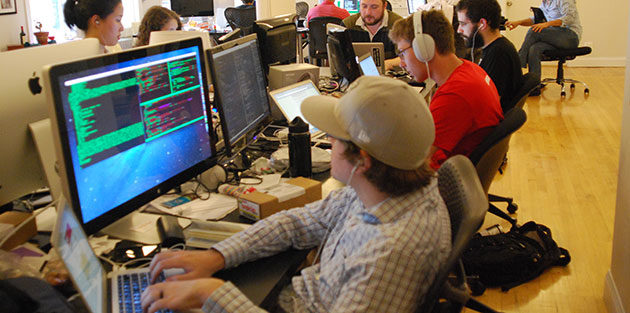Wages Are Like Love by Jeffrey A. Tucker
“The circumstances of time and place are no different for employers and employees.” – Jeffrey Tucker.
All this talk about raising the minimum wage has very little to do with reality. Raising it will not create a single job—if you aren’t earning a wage, making yourself more expensive is not going gain you a job—and will not likely cause anyone’s wages to rise. It’s hard to find anyone who is actually willing to contradict those claims, because they stem from basic price theory: Less of the same good will be purchased at a higher price than a lower price.
The timing is also incredibly bad. Business is already dealing with huge cost increases because of Obamacare. Many businesses are in full protest mode. Plus, employment markets are soft.
Economic growth in general is under downward pressure, with even past growth rates being revised downward. Economic growth is so pathetic now that Janet Yellen, the new head of the Fed, took a page from the Soviet playbook and suggested the bad weather itself is what is to blame—a line still used by Zimbabwe to explain its perpetual woes. It’s a heck of a time to force higher wages on businesses.
But wait. The New York Times has another view.
The writers and editors are arguing for President Obama to increase the minimum wage by executive fiat. And they use a novel argument based on 2013 research published by the Institute for Research on Labor and Employment at Berkeley University. This new research, based on data from many regions and time periods, suggests one clear effect of higher minimum wages. The labor force that remains after the wage hike tends to stick around longer because people don’t tend to move from job to job.
Now, in some way, this conclusion follows intuition. Once a business has trained someone and then gets coerced into paying that person more than he or she would otherwise earn, the business is going to be ever more dedicated to squeezing every bit of actual labor out of the person.
Business is less inclined to hire expensive new people and more inclined to press existing labor for performance. Workers are going to be less willing to risk leaving a crummy job that they are overpaid for doing because the job options have become tighter and muddier thanks to an increased wage.
In other words, higher minimum wages more deeply entrench what has come to be called “job lock.” Whether the employee and employer are happy with the arrangement or not, jobs tend to be frozen in place as a result of less fluid markets. People cling to what is known and what exists—the devil you know. This makes sense. Markets are synonymous with change. The less markets are allowed to work, the more stagnation you can expect in every area of life.
That doesn’t sound so hot, does it? But there’s another way to spin this effect, and The New York Timeseditorial page does its best to provide just such a spin. In fact, the editorial treats all of this research regarding job lock as wonderful news. It shows that “workers were less likely to leave on their own, and managers were more likely to keep the workers they had on staff to avoid the cost of recruiting and training replacements.”
Remarkable, isn’t it? In this rendering, business is saving money by raising wages, so what’s not to like? To be sure, there is nothing wrong with business doing this on its own. Retaining employees is sometimes good and sometimes bad, depending on a forecast of the future. It all depends, and surely it should be up to business and its labor force to make these decisions without bureaucratic fiat intervening.
What the editorial suggests is that higher wages need to be forced on business because otherwise managers would not understand their own interests. Businesses makes thousands of decisions every week regarding inventory, real estate, websites, accounting, product development, marketing, research and development, and vastly more, but, according to the minimum wage idea, they are clueless about how to manage the wages and salaries of their own workforce with an eye to profit maximization. For this, businesses need government to tell them what to do.
Do you see the presumption here? It is that the Department of Labor—not a profit-making firm but one run by people whose wages and salaries are dictated by law rather than markets—is in a better position than the private sector to know what the market demands. That’s implausible on the face of it, unless you fundamentally believe that markets are dumber than governments and that the price system is nonfunctioning.
That lack of basic economic understanding is only the beginning of the frustrations that economists have when looking at these debates. The urge to boost the minimum wage is driven not by economic considerations but political ones. It is a favor thrown toward unions and large corporations—institutions that already enjoy or pay high wages—at the expense of smaller companies or unemployed/marginal workers who have a hard time gaining any kind of foothold in the market.
The minimum wage also provides public relations benefits to politicians who are more readily seen as people who help people live better lives.
The cited research and the editorial are probably right that higher wages mandated by law tend to lock down existing jobs. But how they can argue that this is a good thing is a real puzzle.
In the real world, wages and salaries are like love; they’re complex and personal matters determined by concerns tied to the peculiarities of time and place. So they’re impossible to legislate from the outside without doing harm. For example, it might be to the advantage of a young person to work for very low wages as a way of getting in the door. Or there might be a benefit to working for free as a way of gaining necessary training.
In the real world, there are occasions when it makes sense to accept a much lower wage than you are currently getting as a way of earning a stake in a company on the rise.
Consider the culture of a startup, for example. Most of the workers are working for free or even negative wages in the hopes of creating something wonderful for the future. This has become a way of life for many people who are living in the tech world. They are making a bet that they can apply their own “sweat equity” to create something marvelous for the future. This is not a small issue, since these are the companies creating our future for us. They do not conform to the minimum-wage model of enterprise.
A consistent effort to impose minimum wages would rule out the startups that are creating the new technologies and services that are making the future possible. These startups ignore the law, which is the only way these enterprises work.
Our central planners tell us all what we should earn and what we should pay. In the end, these are intimate details of life that are unique to our lives, to time, to place. Central plans will always miss the mark and end up forcing inapplicable models upon us that do not meet the needs of a free-enterprise economy. That they believe they know is an expression of arrogance and an expression of an underlying belief that force is a better system than agreement.
 ABOUT JEFFREY A. TUCKER
ABOUT JEFFREY A. TUCKER
Jeffrey Tucker is a distinguished fellow at FEE, CEO of the startup Liberty.me, and publisher at Laissez Faire Books. He will be speaking at the FEE summer seminar “Making Innovation Possible: The Role of Economics in Scientific Progress.”


